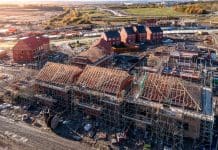UK construction output data for August has signalled a setback for the industry’s recovery, as survey respondents blame a lack of new work
August data pointed to a setback for the recovery in UK construction output, with growth easing from the near five-year high seen during July.
Survey respondents suggested that a lack of new work to replace completed contracts had acted as an obstacle to the speed of expansion.
The seasonally adjusted IHS Markit/CIPS UK Construction Total Activity Index registered 54.6 in August, down from 58.1 in July.
Higher levels of activity have been recorded in each of the past three months, but the latest expansion was the weakest over this period.
Sector data
Housebuilding has registered the strongest rebound since the stoppages of work on site in late-March due to the Covid-19 pandemic.
This trend continued in August, with the Housing Activity Index posting well inside expansion territory (60.7).
The construction output for commercial work (52.5) and civil engineering activity (46.6) were notably weaker than the headline index in August.
New business
Total new business volumes increased for the third month running during August, but the rate of expansion remained only modest and slowed since July.
Construction firms noted that economic uncertainty and a ‘wait-and-see ‘approach among clients had limited their opportunities to secure new work.
However, there was again a wide range of comments from survey respondents in relation to the strength of their order books, which contrasted the multi-speed recovery experienced across different sectors of the UK economy.
Supply chain disruption persisted across the construction sector, which led to another sharp downturn in vendor performance.
Stock shortages and an imbalance of supply and demand for construction inputs contributed to higher purchasing costs. The overall rate of input price inflation was the highest since April 2019.
Business expectations
Despite reporting subdued new business intakes since the start of the pandemic, construction companies reported an improvement in their business expectations for the year ahead.
43% of survey respondents expect a rise in construction output over the next 12 months as those that anticipate a fall (19%). This was often linked to hopes of a boost from major infrastructure projects and resilient public sector construction spending.
However, an expected rise in business activity could not prevent a further drop in staffing numbers. The rate of job shedding eased only slightly since July and remained among the fastest seen over the past decade.
‘A bump in the road’
Duncan Brock, group director at the Chartered Institute of Procurement & Supply: “The momentum in the sector’s recovery hit a bump in the road in August with a sudden slowdown in output growth and tender opportunities, while employment trends remained the most fragile in a decade.
“This stalled progress was not a surprise given the warning signs last month that any hard-won progress could start to fizzle out.
“As new order gains slowed across all sectors, continuing Covid-19 anxiety amongst clients meant many projects still remained on ice. Though residential building remained the strongest, it too was showing signs of strain.
“In addition, there were ongoing difficulties in supply chains which hampered the sourcing of raw materials. Delivery times lengthened in August as a result of stock shortages at suppliers and cost increases were the highest since April 2019.
“Even with all these obstacles, builders were at their most optimistic since the beginning of the year. This glass half full attitude will have to carry companies into the autumn as the UK economy remains delicate and susceptible to more turbulence.”
Mark Robinson, chief executive of Scape Group, commented: “The construction industry took another positive step along the road to recovery, however, with the country in deep recession and with the prospect of a spike in unemployment as furlough support measures begin to ease, the long-term picture remains uncertain.
“With private capital likely to be less forthcoming in the coming months, the public sector must continue to be the driving force behind the sector’s output. Progressive local authorities are rightly seeing urban regeneration as a central pillar of their recovery plans to not only support short term job creation in construction, but to shape new sustainable places and opportunities that will inject new life into local economies and communities.
“To do so, it’s essential that the next round of planned ‘build, build, build’ projects are revealed and progressed quickly.
“With that in mind, government must now look to identify the right partners that are fully equipped to accelerate the design and build process without compromising on quality or the requirements of the wellbeing economy.”
Jessica Levy, director of communications of the Federation of Master Builders (FMB), added: “The slowdown in growth reported in today’s Construction PMI report points to the need for policies which sustain much-needed jobs and activity, and give consumers confidence to invest.
“The Green Homes Grants scheme has the potential to do this, but just weeks away from its roll out, the government needs to step up support for builders to gain recognition for their competence and high quality workmanship and register for the scheme.
“Rightly, the focus is on competency, but the mechanisms proposed are complex, especially within the government’s ambitious timescales. The time and costs involved in accreditation risk putting off quality builders who otherwise are committed to doing their bit to achieve net-zero.”














